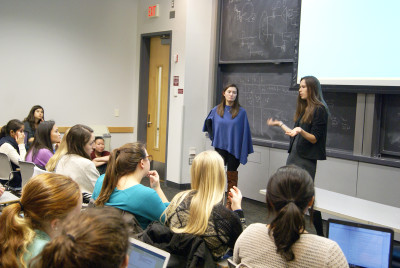
Gap Week, a weeklong celebration to unite women with dialogue about gender inequality, was introduced Tuesday during an information session at the Boston University Photonics Center. The event will be hosted by the BU Student Government from Mar. 14 to 19, 2016.
Mim Eiben, an executive coordinator of Gap Week, said the showcase aims to foster respect and equality within the BU community through a variety of events and workshops. Gap Week will host events on topics such as successful women in business and politics, women in STEM fields and female-led philanthropic endeavors, Eiben said during the information session.
Eiben, a sophomore in the Questrom School of Business, said she has sent over 200 emails informing student groups about the meeting and hopes various groups take part in the initiative’s preparation.
“We want to make sure to tap into as many different ways that people react to this issue [of gender inequality] as possible,” Eiben said. “Ideally, the student groups will all be [planning and participating], and interacting and bringing together the BU community over something that is so universal.”
Yasmin Gentry, also an executive coordinator and a senior in the College of Arts and Sciences and the College of Communication, said support from the student body and a coalition of student organizations would help shape what events will happen during Gap Week.
“Generally we have had very supportive feedback,” Gentry said. “One of the things [is] that we did leave the proposal vague, so we could leave it up to the students what types of things would go into Gap Week.”
Gentry said she hoped Gap Week would unify all the different groups on campus that focus on similar issues.
“Campus unity in regards to equality and respect for the people who desire and who are still working for it is so important,” she said, “so that’s the main goal. I want everybody to be talking about this. I want it to almost be like a BU holiday week.”
Virginia Sapiro, a professor of political science in CAS, said Gap Week is a productive event that will allow a space for better discussions on women’s issues.
“Silence is the worst thing that can happen,” the former CAS dean wrote in an email. “Good discussion, especially backed up by a careful look into the facts, can certainly help address the challenges we still face.”
Sapiro, however, said the wide use of the term “gender-gap” on campus has ambiguously described issues regarding gender inequality. Issues such as gender-based violence and aggression tend to dismiss women who raise the importance of gender as being “politically correct,” she said.
“We are facing [very challenging issues] about the very definition of ‘gender’ and how we think about our gendered identity and experiences raised by discussions of transgender identity,” she said. “Many aspects of gender inequalities are being addressed, at least to some degree. But we still have a lot more to do!”
Several student group representatives said they supported the general idea of Gap Week, but voiced their concerns over the name of the event. Heather Cohen, an executive board member of Feminist Collective, said that the name Gap Week doesn’t encompass all the issues relating to gender inequality.
“I don’t think [the name] makes sense since the only gap is the wage gap,” Cohen, a senior in the School of Education, said. “If they are trying to talk about women’s issues, saying ‘Gap Week’ doesn’t make that clear.”
Tiffany Lo, a senior in CAS, said she hopes her group, Women in Computer Science, can interact with other groups on campus to expand the group’s reach to the student body.
“One of [Women in Computer Science’s] major goals for this year was to expand what the club does beyond CS and reach out to a larger community of people interested in technology,” Lo said. “Gap Week provides a very interesting platform for us to either collaborate with a larger group, or just to have a larger reach talking about women in technology.”
Aaryn Clerk, another E-board member for FemCo and a junior in SED, said she hopes Gap Week will truly encompass all women.
“We are in consensus that we want the week to be very intersectional and inclusive of all women,” Clerk said. “Not just cis[gender] women or straight women or white women. We want to make sure that this isn’t the type of event that says, ‘Oh well women can empower themselves.’ We want it to address systemic inequality and oppression.”



















































































































